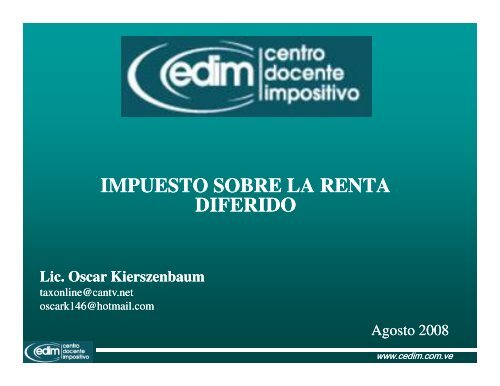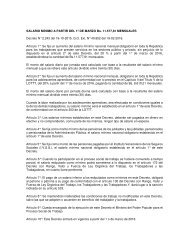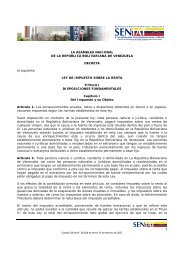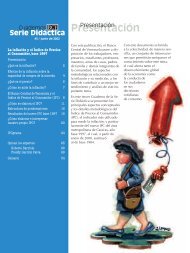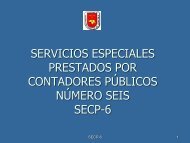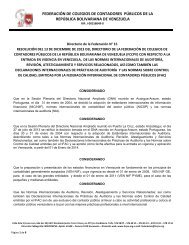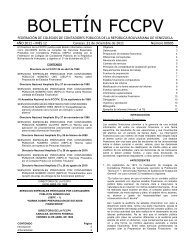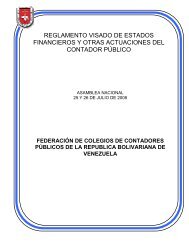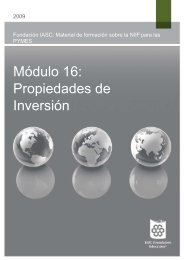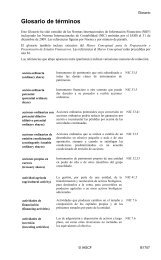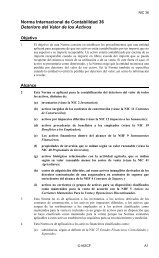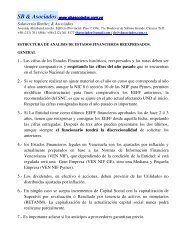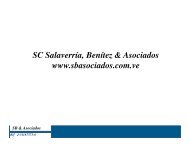IMPUESTO SOBRE LA RENTA DIFERIDO
IMPUESTO SOBRE LA RENTA DIFERIDO
IMPUESTO SOBRE LA RENTA DIFERIDO
You also want an ePaper? Increase the reach of your titles
YUMPU automatically turns print PDFs into web optimized ePapers that Google loves.
<strong>IMPUESTO</strong> <strong>SOBRE</strong> <strong>LA</strong> <strong>RENTA</strong><br />
<strong>DIFERIDO</strong><br />
Lic. Oscar Kierszenbaum<br />
taxonline@cantv.net<br />
oscark146@hotmail.com<br />
Agosto 2008<br />
www.cedim.com.ve<br />
www.cedim.com.ve
<strong>IMPUESTO</strong> <strong>SOBRE</strong> <strong>LA</strong> <strong>RENTA</strong> <strong>DIFERIDO</strong><br />
1. EL <strong>IMPUESTO</strong> <strong>SOBRE</strong> <strong>LA</strong> <strong>RENTA</strong><br />
La Ley del Impuesto sobre la Renta grava los<br />
enriquecimientos obtenidos por las personas jurídicas.<br />
La contabilidad tiene como objetivo registrar la<br />
información económica y financiera que afecta a las<br />
personas jurídicas. Dentro de esa información debe<br />
incluir la obligación que se genera con el ente<br />
recaudador, el Impuesto sobre la Renta calculado<br />
sobre el enriquecimiento y el gasto que ese hecho<br />
determina.
<strong>IMPUESTO</strong> <strong>SOBRE</strong> <strong>LA</strong> <strong>RENTA</strong> <strong>DIFERIDO</strong><br />
2. CONTABILIZACION DEL <strong>IMPUESTO</strong> <strong>SOBRE</strong> <strong>LA</strong><br />
<strong>RENTA</strong>:<br />
Las empresas para cumplir con el requisito de contabilizar el<br />
Impuesto sobre la Renta, debe registrar en su contabilidad,<br />
dentro del ejercicio que corresponde, el cargo al gasto así<br />
como la correspondiente obligación de pagar el impuesto.<br />
El asiento a efectuar sería el siguiente:<br />
Gastos Impuesto sobre la Renta<br />
a Impuesto sobre la Renta a Pagar<br />
Las Empresas registran este asiento tomando las cifras que<br />
surgen en las Declaraciones Definitivas del Impuesto sobre<br />
la Renta
<strong>IMPUESTO</strong> <strong>SOBRE</strong> <strong>LA</strong> <strong>RENTA</strong> <strong>DIFERIDO</strong><br />
De esta manera que podríamos denominar contabilización<br />
tradicional tradicional, , resultan iguales los montos que se registran<br />
como gasto, así como la deuda que ser origina por la<br />
obligación tributaria.<br />
Impuesto sobre la Renta Contable = Impuesto determinado en<br />
la Declaración Definitiva
<strong>IMPUESTO</strong> <strong>SOBRE</strong> <strong>LA</strong> <strong>RENTA</strong> <strong>DIFERIDO</strong><br />
3. <strong>IMPUESTO</strong> <strong>SOBRE</strong> <strong>LA</strong> <strong>RENTA</strong> DEVENGADO:<br />
El procedimiento tradicional de contabilización del Impuesto<br />
sobre la Renta (registrar el monto del impuesto como gasto y<br />
como pasivo según el monto determinado en la Declaración<br />
del impuesto sobre la Renta) no refleja el verdadero gasto que<br />
se origina de la utilidad que debería pagar el Impuesto sobre<br />
la Renta.<br />
Esto es debido a que al tomar como cargo el impuesto<br />
determinado en la Declaración del Impuesto sobre la Renta, se<br />
está desconociendo los gastos e ingresos que no lo son del<br />
desde el punto de vista contable y si para el fiscal, o bien no<br />
reconociendo ingresos o gastos contables que no son admitidos<br />
en la legislación impositiva.
<strong>IMPUESTO</strong> <strong>SOBRE</strong> <strong>LA</strong> <strong>RENTA</strong> <strong>DIFERIDO</strong><br />
Debemos recordar que las disposiciones de la Ley del Impuesto<br />
sobre la Renta aplicable a la determinación del enriquecimiento y<br />
del impuesto a pagar tienen muchos puntos de discrepancias<br />
respecto a las normas contables en lo que se refiere a la<br />
determinación de los ingresos, costos y gastos.<br />
El registro de ingresos en la contabilidad se efectúa en el momento<br />
en que se devenga, mientras que en la Ley del Impuesto sobre la<br />
renta se establece que algunos ingresos se gravan en base a lo<br />
cobrado. Igualmente contablemente registramos los gastos cuando<br />
estos se originan, mientras que la Ley del Impuesto sobre la Renta,<br />
en algunos casos, los considera como un gasto deducible en el<br />
momento en que se pagan.
<strong>IMPUESTO</strong> <strong>SOBRE</strong> <strong>LA</strong> <strong>RENTA</strong> <strong>DIFERIDO</strong><br />
Las normas de contabilidad establecen que los costos y gastos<br />
deben estar vinculados a los ingresos, y que deben ser<br />
imputados el mismo período en que se origina el ingreso. Y<br />
debemos estar claros que cualquier impuesto que se calcule<br />
sobre la ganancia debe cumplir con este requisito. Por lo<br />
tanto si el impuesto se relaciona con ingresos o ganancias<br />
de un período debe imputarse como gasto en el mismo<br />
período en que se generaron los ingresos o ganancias.
<strong>IMPUESTO</strong> <strong>SOBRE</strong> <strong>LA</strong> <strong>RENTA</strong> <strong>DIFERIDO</strong><br />
4. EL METODO DEL <strong>IMPUESTO</strong> <strong>DIFERIDO</strong>:<br />
Para corregir los defectos de la contabilización tradicional<br />
surge el método del Impuesto sobre la Renta Diferido, a<br />
través del cual se asocian adecuadamente en el tiempo el<br />
ingreso con el gasto relacionado (La Utilidad Contable y el<br />
gasto por Impuesto sobre la Renta), determinando de esta<br />
manera el gasto que se origina contablemente sobre la base<br />
de lo causado.<br />
Las diferencias entre las normas impositivas y contables en<br />
cuanto a ingresos y gastos hacen que los efectos<br />
impositivos de los resultados contables impacten en<br />
períodos distintos a aquellos en lo que se computan estos<br />
últimos.
<strong>IMPUESTO</strong> <strong>SOBRE</strong> <strong>LA</strong> <strong>RENTA</strong> <strong>DIFERIDO</strong><br />
5. DIFERENCIAS DE TIEMPO O TEMPORALES Y<br />
DIFERENCIAS PERMANENTES<br />
Las diferencias entre las normas del Impuesto sobre la Renta y<br />
las normas contables en lo relativo a la determinación de la<br />
gravabilidad de los ingresos y gastos pueden ser de dos<br />
tipos:<br />
• Diferencias de tiempo o temporales.<br />
• Diferencias permanentes.
<strong>IMPUESTO</strong> <strong>SOBRE</strong> <strong>LA</strong> <strong>RENTA</strong> <strong>DIFERIDO</strong><br />
6. DIFERENCIAS DE TIEMPO O TEMPORALES:<br />
Son aquellas diferencias que en el ejercicio fiscal, para<br />
efectos impositivos, se consideran como ingresos no<br />
gravables o gastos no deducibles y que se gravan o se<br />
deducen en ejercicios futuros.<br />
Esto implica que una diferencia de tiempo producida en un<br />
ejercicio estará sujeta a reversión en ejercicios futuros.
<strong>IMPUESTO</strong> <strong>SOBRE</strong> <strong>LA</strong> <strong>RENTA</strong> <strong>DIFERIDO</strong><br />
EJEMPLOS DE DIFERENCIAS TEMPORALES:<br />
Las diferencias de tiempo que se producen por el tratamiento<br />
que se les da a las utilidades en la Contabilidad de la<br />
Empresa y el tratamiento que les da a las utilidades en la Ley<br />
del Impuesto sobre la Renta, son las siguientes:<br />
Impuestos diferidos pasivos:<br />
Son los que surgen por las diferencias de tiempo gravables gravables. .<br />
Ingresos que se registran contablemente pero para efectos<br />
impositivos se gravan en ejercicios futuros:
<strong>IMPUESTO</strong> <strong>SOBRE</strong> <strong>LA</strong> <strong>RENTA</strong> <strong>DIFERIDO</strong><br />
a. Ingresos provenientes de las ventas de inmuebles a plazos, los cuales,<br />
para para efectos financieros se reconocen reconocen al perfeccionarse la venta,<br />
mientras que para efectos fiscales se gravan en base a lo cobrado.<br />
(Artículo 5 de la Ley del ISLR)<br />
b. Ingresos devengados para efectos financieros, pero para fines fiscales<br />
son gravados en base a lo cobrado:<br />
1. Arrendamientos<br />
2. Honorarios<br />
(Artículo 5 de la Ley del ISLR)<br />
c. Construcción de obras que hayan de realizarse en un período no mayor<br />
de un (1)año, que comprenda parte de dos (2) ejercicios gravables,<br />
cuando el contribuyente opte por declarar la totalidad de los ingresos<br />
en el ejercicio en que terminen las construcciones. (Artículo 19 de la<br />
Ley del ISLR).
<strong>IMPUESTO</strong> <strong>SOBRE</strong> <strong>LA</strong> <strong>RENTA</strong> <strong>DIFERIDO</strong><br />
Impuestos diferidos activos:<br />
Son los que surgen por las diferencias de tiempo deducibles deducibles. . Gastos<br />
que se registran contablemente en el ejercicio pero para efectos<br />
impositivos se deducen en ejercicios futuros:<br />
a. a. Provisiones para cuentas incobrables, cuyos montos serán<br />
considerados como gastos en el ejercicio en que se causen, mientras<br />
que para efectos fiscales serán deducibles cuando se demuestre su<br />
verdadera incobrabilidad. (numeral 8 del artículo 27 de la Ley de<br />
ISLR)<br />
b. Provisiones para obsolescencia de inventarios, cuyos montos serán<br />
considerados como gastos en el ejercicio en que se constituyen,<br />
mientras que para efectos fiscales serán deducibles cuando se den de<br />
baja de los inventarios.
<strong>IMPUESTO</strong> <strong>SOBRE</strong> <strong>LA</strong> <strong>RENTA</strong> <strong>DIFERIDO</strong><br />
c. Provisiones para el pago de de indemnizaciones por despido injustificado de<br />
trabajadores de acuerdo a lo establecido en la Ley del Trabajo, artículo<br />
125, cuyos montos serán considerados como gastos en el ejercicio en que<br />
se causen, mientras que para efectos fiscales serán deducibles cuando se<br />
paguen.<br />
d. Las diferencias en el tratamiento financiero y fiscal de ciertos activos y<br />
pasivos:<br />
o Diferencia en el método de depreciación<br />
o Diferencia en el tratamiento del arrendamiento financiero.
<strong>IMPUESTO</strong> <strong>SOBRE</strong> <strong>LA</strong> <strong>RENTA</strong> <strong>DIFERIDO</strong><br />
e. Gastos que se consideran causados para efectos financieros,<br />
mientras que para efectos fiscales se reconocen como gastos<br />
deducibles cuando se pagan:<br />
1. Tributos ( Artículo 27 numeral tercero de la Ley de ISLR)<br />
2. 2. Gastos de conservación y administración de inmuebles dados<br />
en arrendamiento. ( Artículo 27 numeral 11 de la Ley de<br />
ISLR)<br />
3. Los gastos de investigación y desarrollo (Artículo 27 numeral<br />
20 de la Ley de ISLR).
<strong>IMPUESTO</strong> <strong>SOBRE</strong> <strong>LA</strong> <strong>RENTA</strong> <strong>DIFERIDO</strong><br />
Otros Casos de Diferencias Temporales<br />
a. Pérdidas Impositivas trasladables<br />
• Pérdidas de Explotación (3 años) (Art. 55 Ley)<br />
• Pérdidas por Ajuste por Inflación (1 año) (Art. 183 Ley)<br />
b. Rebajas por nuevas inversiones trasladables (3 años)
<strong>IMPUESTO</strong> <strong>SOBRE</strong> <strong>LA</strong> <strong>RENTA</strong> <strong>DIFERIDO</strong><br />
DIFERENCIAS PERMANENTES:<br />
GASTOS NO DEDUCIBLES:<br />
1. Gastos de viajes en el exterior (numeral 13 del artículo 27 de la<br />
ley del ISLR)<br />
2. 50% de los pasajes entre Venezuela y el Exterior o viceversa<br />
(numeral 13 del artículo 27 de la ley del ISLR)<br />
3. Excedente del quince por ciento (15%) del ingreso bruto global<br />
por concepto de pago de sueldos y demás remuneraciones<br />
similares pagadas a administradores de compañías anónimas<br />
(parágrafo segundo del artículo 27 de la ley del ISLR)
<strong>IMPUESTO</strong> <strong>SOBRE</strong> <strong>LA</strong> <strong>RENTA</strong> <strong>DIFERIDO</strong><br />
4. Los intereses de mora (numeral segundo del artículo 27 de la ley<br />
del impuesto sobre la renta)<br />
5. Los tributos establecidos en la ley (Tasa RAR, Impuesto sobre la<br />
Renta) (numeral tercero del artículo 27 de la ley del ISLR)<br />
6.<br />
6. Excedente Excedente del del diez diez por por ciento ciento (10%) (10%) de de los los ingresos brutos<br />
percibidos por arrendamientos de bienes inmuebles, por<br />
concepto de gastos de administración. (parágrafo cuarto del<br />
artículo 27 de la ley del impuesto sobre la renta)<br />
7. Excedente de las liberalidades y donaciones efectuadas durante el<br />
ejercicio tributario que superen los porcentajes que establece la<br />
ley (parágrafo decimotercero del artículo 27 de la ley del ISLR).<br />
8. Multas
<strong>IMPUESTO</strong> <strong>SOBRE</strong> <strong>LA</strong> <strong>RENTA</strong> <strong>DIFERIDO</strong><br />
INGRESOS NO GRAVABLES:<br />
1. Los dividendos recibidos de terceros.<br />
2.<br />
2. Los Los enriquecimientos enriquecimientos provenientes provenientes de de los los bonos bonos de de la la deuda<br />
Pública Nacional y cualquier otra modalidad de título valor<br />
emitido por la República. (numeral 13 del artículo 14 de la ley<br />
del ISLR)
<strong>IMPUESTO</strong> <strong>SOBRE</strong> <strong>LA</strong> <strong>RENTA</strong> <strong>DIFERIDO</strong><br />
C<strong>LA</strong>SIFICACION DE LOS METODOS<br />
PARA CONTABILIZAR EL EFECTO DEL<br />
<strong>IMPUESTO</strong> <strong>SOBRE</strong> <strong>LA</strong> <strong>RENTA</strong>:<br />
1. METODO TRADICIONAL<br />
2.<br />
2. METODO DEL <strong>IMPUESTO</strong> <strong>SOBRE</strong> <strong>LA</strong> <strong>RENTA</strong> BASADO<br />
EN EL ESTADO DE RESULTADOS.<br />
3. METODO DEL <strong>IMPUESTO</strong> <strong>SOBRE</strong> <strong>LA</strong> <strong>RENTA</strong> BASADO<br />
EN EL BA<strong>LA</strong>NCE.
<strong>IMPUESTO</strong> <strong>SOBRE</strong> <strong>LA</strong> <strong>RENTA</strong> <strong>DIFERIDO</strong><br />
Exposición de casos prácticos en la adopción de las<br />
Normas Internacionales de Contabilidad<br />
y sus efectos tributarios en la determinación<br />
del Impuesto sobre la Renta<br />
Impuesto sobre la renta diferido<br />
Diferencias de Tiempo y Diferencias Permanentes<br />
Diferencias de Tiempo<br />
Ejercicio Nro. 1<br />
Impuestos Diferidos Activos<br />
Gastos deducibles en ejercicios futuros
<strong>IMPUESTO</strong> <strong>SOBRE</strong> <strong>LA</strong> <strong>RENTA</strong> <strong>DIFERIDO</strong><br />
METODO TRADICIONAL<br />
Sin la aplicación del impuesto diferido:<br />
Concepto Ejercicio 2006 Ejercicio 2007<br />
Resultado contable 100,000 100,000<br />
Diferencias temporales (Gasto deducible cuando se pague) 1,000 -1,000 1,000<br />
Enriquecimiento gravable 101,000 99,000<br />
Tarifa nro. 2 - 34% 34% 34%<br />
Impuesto causado 34,340 33,660
<strong>IMPUESTO</strong> <strong>SOBRE</strong> <strong>LA</strong> <strong>RENTA</strong> <strong>DIFERIDO</strong><br />
Asientos de Diario<br />
En el Ejercicio 2006<br />
Gasto Impuesto sobre la Renta 34,340<br />
a Impuesto sobre la Renta a pagar 34,340<br />
En el Ejercicio 2007<br />
Gasto Impuesto sobre la Renta 33,660<br />
a Impuesto sobre la Renta a pagar 33,660
<strong>IMPUESTO</strong> <strong>SOBRE</strong> <strong>LA</strong> <strong>RENTA</strong> <strong>DIFERIDO</strong><br />
METODO <strong>IMPUESTO</strong> <strong>SOBRE</strong> <strong>LA</strong> <strong>RENTA</strong> <strong>DIFERIDO</strong><br />
Con la aplicación del impuesto diferido:<br />
Concepto Ejercicio 2006 Ejercicio 2007<br />
Resultado contable 100,000 100,000<br />
Diferencias temporales (Gasto deducible cuando se pague) 1,000 -1,000 1,000<br />
Enriquecimiento gravable 101,000 99,000<br />
Tarifa nro. 2 - 34% 34% 34%<br />
Impuesto causado 34% sobre Bs. 100.000 (Utilidad contable) 34,000 34,000<br />
Impuesto sobre la renta diferido (34% sobre la diferencia temporal) 340 -340 340<br />
Impuesto sobre la renta a pagar 34,340 33,660
<strong>IMPUESTO</strong> <strong>SOBRE</strong> <strong>LA</strong> <strong>RENTA</strong> <strong>DIFERIDO</strong><br />
Asientos de Diario<br />
En el Ejercicio 2006<br />
Gasto Impuesto sobre la Renta 34,000<br />
Impuesto sobre la Renta diferido 340<br />
a Impuesto sobre la Renta a pagar 34,340<br />
En el Ejercicio 2007<br />
Gasto Impuesto sobre la Renta 34,000<br />
a Impuesto sobre la Renta diferido 340<br />
a Impuesto sobre la Renta a pagar 33,660
<strong>IMPUESTO</strong> <strong>SOBRE</strong> <strong>LA</strong> <strong>RENTA</strong> <strong>DIFERIDO</strong><br />
Ejercicio Nro. 2<br />
Impuestos Diferidos Pasivos<br />
Ingresos Gravables en Ejercicios Futuros
<strong>IMPUESTO</strong> <strong>SOBRE</strong> <strong>LA</strong> <strong>RENTA</strong> <strong>DIFERIDO</strong><br />
METODO TRADICIONAL<br />
Sin la aplicación del impuesto diferido:<br />
Concepto Ejercicio 2006 Ejercicio 2007<br />
Resultado contable 100,000 100,000<br />
Diferencias temporales (Ingreso gravable cuando se cobra) -10,000 10,000 10,000<br />
Enriquecimiento gravable 90,000 110,000<br />
Tarifa nro. 2 - 34% 34% 34%<br />
Impuesto causado 30,600 37,400
<strong>IMPUESTO</strong> <strong>SOBRE</strong> <strong>LA</strong> <strong>RENTA</strong> <strong>DIFERIDO</strong><br />
Asientos de Diario<br />
En el Ejercicio 2006<br />
Gasto Impuesto sobre la Renta 30,600<br />
a Impuesto sobre la Renta a pagar 30,600<br />
En el Ejercicio 2007<br />
Gasto Impuesto sobre la Renta 37,400<br />
a Impuesto sobre la Renta a pagar 37,400
<strong>IMPUESTO</strong> <strong>SOBRE</strong> <strong>LA</strong> <strong>RENTA</strong> <strong>DIFERIDO</strong><br />
METODO <strong>IMPUESTO</strong> <strong>SOBRE</strong> <strong>LA</strong> <strong>RENTA</strong> <strong>DIFERIDO</strong><br />
Con la aplicación del impuesto diferido:<br />
Concepto Ejercicio 2006 Ejercicio 2007<br />
Resultado contable 100,000 100,000<br />
Diferencias temporales (Ingreso gravable cuando se cobra) -10,000 10,000 10,000<br />
Enriquecimiento gravable 90,000 110,000<br />
Tarifa nro. 2 - 34% 34% 34%<br />
Impuesto Impuesto causado 34% sobre Bs. 100.000 (Utilidad contable) 34,000 34,000<br />
Impuesto sobre la renta diferido (34% sobre la diferencia temporal) -3,400 3,400 3,400<br />
Impuesto sobre la renta a pagar 30,600 37,400
<strong>IMPUESTO</strong> <strong>SOBRE</strong> <strong>LA</strong> <strong>RENTA</strong> <strong>DIFERIDO</strong><br />
Asientos de Diario<br />
En el Ejercicio 2006<br />
Gasto Impuesto sobre la Renta 34,000<br />
a Impuesto sobre la Renta diferido 3,400<br />
a Impuesto sobre la Renta a pagar 30,600<br />
En el Ejercicio 2007<br />
Gasto Impuesto sobre la Renta 34,000<br />
Impuesto sobre la Renta diferido 3,400<br />
a Impuesto sobre la Renta a pagar 37,400
<strong>IMPUESTO</strong> <strong>SOBRE</strong> <strong>LA</strong> <strong>RENTA</strong> <strong>DIFERIDO</strong><br />
DIFERENCIAS PERMANENTES<br />
Ejercicio Nro. 3<br />
Gastos no Deducibles<br />
Concepto Ejercicio 2006 Ejercicio 2007<br />
Resultado contable 99,000 100,000<br />
Diferencias permanentes (Gasto no deducible) 1,000<br />
Enriquecimiento gravable 100,000 100,000<br />
Tarifa nro. 2 - 34% 34% 34%<br />
Impuesto causado 34% sobre Bs. 100.000 (Utilidad fiscal) 34,000 34,000<br />
Impuesto sobre la renta a pagar 34,000 34,000
<strong>IMPUESTO</strong> <strong>SOBRE</strong> <strong>LA</strong> <strong>RENTA</strong> <strong>DIFERIDO</strong><br />
DIFERENCIAS PERMANENTES<br />
Ejercicio Nro. 4<br />
Ingresos no Gravables<br />
Concepto Ejercicio 2006 Ejercicio 2007<br />
Resultado contable 101,000 100,000<br />
Diferencias permanentes (Ingreso no gravable) -1,000 1,000<br />
Enriquecimiento gravable 100,000 100,000<br />
Tarifa nro. 2 - 34% 34% 34%<br />
Impuesto causado 34% sobre Bs. 100.000 (Utilidad fiscal) 34,000 34,000<br />
Impuesto sobre la renta a pagar 34,000 34,000
<strong>IMPUESTO</strong> <strong>SOBRE</strong> <strong>LA</strong> <strong>RENTA</strong> <strong>DIFERIDO</strong><br />
Ejercicio donde existen diferencias permanente y<br />
diferencias temporales:<br />
Ejercicio Nro. 5<br />
Impuestos Diferidos Activos<br />
Gastos deducibles en ejercicios futuros
<strong>IMPUESTO</strong> <strong>SOBRE</strong> <strong>LA</strong> <strong>RENTA</strong> <strong>DIFERIDO</strong><br />
METODO TRADICIONAL<br />
Sin la aplicación del impuesto diferido:<br />
Concepto Ejercicio 2006 Ejercicio 2007<br />
Resultado contable 100,000 100,000<br />
Diferencias permanentes ( Multas) 5,000 6,000<br />
Resultado después de las diferencias permanentes 105,000 106,000<br />
Diferencias temporales (Tributos no pagados) 10,000 -10,000 10,000<br />
Enriquecimiento gravable 115,000 96,000<br />
Tarifa nro. 2 - 34% 34% 34%<br />
Impuesto causado 39,100 32,640
<strong>IMPUESTO</strong> <strong>SOBRE</strong> <strong>LA</strong> <strong>RENTA</strong> <strong>DIFERIDO</strong><br />
Asientos de Diario<br />
En el Ejercicio 2006<br />
Gasto Impuesto sobre la Renta 39,100<br />
a Impuesto sobre la Renta a pagar 39,100<br />
En el Ejercicio 2007<br />
Gasto Impuesto sobre la Renta 32,640<br />
a Impuesto sobre la Renta a pagar 32,640
<strong>IMPUESTO</strong> <strong>SOBRE</strong> <strong>LA</strong> <strong>RENTA</strong> <strong>DIFERIDO</strong><br />
METODO <strong>IMPUESTO</strong> <strong>SOBRE</strong> <strong>LA</strong> <strong>RENTA</strong> <strong>DIFERIDO</strong><br />
Con la aplicación del impuesto diferido:<br />
Concepto Ejercicio 2006 Ejercicio 2007<br />
Resultado contable 100,000 100,000<br />
Diferencias permanentes (Multas) 5,000 6,000<br />
Resultado después de las diferencias permanentes 105,000 106,000<br />
Diferencias temporales (Tributos no pagados) 10,000 -10,000 10,000<br />
Enriquecimiento gravable 115,000 96,000<br />
Tarifa nro. 2 - 34% 34% 34%<br />
Impuesto causado (34% sobre el resultado después de las diferencias permanentes) 35,700 36,040<br />
Impuesto sobre la Renta diferido ( 34% sobre las diferencias temporales) 3,400 -3,400 3,400<br />
Impuesto sobre la Renta a pagar 39,100 32,640
<strong>IMPUESTO</strong> <strong>SOBRE</strong> <strong>LA</strong> <strong>RENTA</strong> <strong>DIFERIDO</strong><br />
Asientos de Diario<br />
En el Ejercicio 2006<br />
Gasto Impuesto sobre la Renta 35,700<br />
Impuesto sobre la Renta diferido 3,400<br />
a Impuesto sobre la Renta a pagar 39,100<br />
En el Ejercicio 2007<br />
Gasto Impuesto sobre la Renta 36,040<br />
a Impuesto sobre la Renta diferido 3,400<br />
a Impuesto sobre la Renta a pagar 32,640
<strong>IMPUESTO</strong> <strong>SOBRE</strong> <strong>LA</strong> <strong>RENTA</strong> <strong>DIFERIDO</strong><br />
Ejercicio donde existen diferencias permanente y<br />
diferencias temporales:<br />
Ejercicio Nro. 6<br />
Impuestos Diferidos Pasivos<br />
Ingresos gravables en ejercicios futuros
<strong>IMPUESTO</strong> <strong>SOBRE</strong> <strong>LA</strong> <strong>RENTA</strong> <strong>DIFERIDO</strong><br />
METODO TRADICIONAL<br />
Sin la aplicación del impuesto diferido:<br />
Concepto Ejercicio 2006 Ejercicio 2007<br />
Resultado contable 100,000 100,000<br />
Diferencias permanentes (Dividendos Cobrados) -30,000 30,000 -20,000 20,000<br />
Resultado después de las diferencias permanentes 70,000 80,000<br />
Diferencias temporales ( Honorarios no Cobrados) -10,000 10,000 10,000<br />
Enriquecimiento gravable 60,000 90,000<br />
Tarifa nro. 2 - 34% 34% 34%<br />
Impuesto causado 20,400 30,600
<strong>IMPUESTO</strong> <strong>SOBRE</strong> <strong>LA</strong> <strong>RENTA</strong> <strong>DIFERIDO</strong><br />
Asientos de Diario<br />
En el Ejercicio 2006<br />
Gasto Impuesto sobre la Renta 20,400<br />
a Impuesto sobre la Renta a pagar 20,400<br />
En el Ejercicio 2007<br />
Gasto Impuesto sobre la Renta 30,600<br />
a Impuesto sobre la Renta a pagar 30,600
<strong>IMPUESTO</strong> <strong>SOBRE</strong> <strong>LA</strong> <strong>RENTA</strong> <strong>DIFERIDO</strong><br />
METODO <strong>IMPUESTO</strong> <strong>SOBRE</strong> <strong>LA</strong> <strong>RENTA</strong> <strong>DIFERIDO</strong><br />
Con la aplicación del impuesto diferido:<br />
Concepto Ejercicio 2006 Ejercicio 2007<br />
Resultado contable 100,000 100,000<br />
Diferencias permanentes (Dividendos cobrados) -30,000 30,000 -20,000 20,000<br />
Resultado después de las diferencias permanentes 70,000 80,000<br />
Diferencias temporales (Honorarios no cobrados) -10,000 10,000 10,000<br />
Enriquecimiento gravable 60,000 90,000<br />
Tarifa nro. 2 - 34% 34% 34%<br />
Impuesto causado (34% sobre el resultado después de las diferencias permanentes) 23,800 27,200<br />
Impuesto Impuesto sobre la Renta Renta diferido (34% sobre las diferencias de tiempo) -3,400 3,400 3,400<br />
Impuesto a pagar 20,400 30,600
<strong>IMPUESTO</strong> <strong>SOBRE</strong> <strong>LA</strong> <strong>RENTA</strong> <strong>DIFERIDO</strong><br />
Asientos de Diario<br />
En el Ejercicio 2006<br />
Gasto Impuesto sobre la Renta 23,800<br />
a Impuesto sobre la Renta diferido 3,400<br />
a Impuesto sobre la Renta a pagar 20,400<br />
En el Ejercicio 2007<br />
Gasto Impuesto sobre la Renta 27,200<br />
Impuesto sobre la Renta diferido 3,400<br />
a Impuesto sobre la Renta a pagar 30,600
<strong>IMPUESTO</strong> <strong>SOBRE</strong> <strong>LA</strong> <strong>RENTA</strong> <strong>DIFERIDO</strong><br />
APLICACIÓN DEL METODO DEL<br />
<strong>IMPUESTO</strong> <strong>SOBRE</strong> <strong>LA</strong> <strong>RENTA</strong> <strong>DIFERIDO</strong><br />
CASOS PARTICU<strong>LA</strong>RES DE DIFERENCIAS<br />
TEMPORALES<br />
ACTIVO FIJO
<strong>IMPUESTO</strong> <strong>SOBRE</strong> <strong>LA</strong> <strong>RENTA</strong> <strong>DIFERIDO</strong><br />
Diferencia entre las vidas útiles asignadas a un activo fijo<br />
en la contabilidad y para fines fiscales<br />
Año % Contable (5 años) % Fiscal (3 años) Diferencia<br />
1 20 33.33 -13.33 13.33<br />
2 20 33.33 -13.33 13.33<br />
3 20 33.34 -13.34 13.34<br />
4 20 0 20<br />
5 20 0 20<br />
Total 100 100 0<br />
Año Depreciación Contable Depreciación Fiscal Diferencia Efecto fiscal (34%)<br />
1 20,000 33,333 -13,333 13,333 -4,533 4,533<br />
2 20,000 33,333 -13,333 13,333 -4,533 4,533<br />
3 20,000 33,334 -13,334 13,334 -4,534 4,534<br />
4 20,000 0 20,000 6,800<br />
5 20,000 0 20,000 6,800<br />
Total 100,000 100,000 0 0
<strong>IMPUESTO</strong> <strong>SOBRE</strong> <strong>LA</strong> <strong>RENTA</strong> <strong>DIFERIDO</strong><br />
Suponiendo que la utilidad contable es de Bs. 100.000 en los<br />
cinco ejercicios.<br />
Asientos de Diario<br />
En el año 1<br />
Gasto Impuesto sobre la Renta 34,000<br />
a Impuesto sobre la Renta diferido 4,533<br />
a Impuesto sobre la Renta a pagar 29,467<br />
En el año 2<br />
Gasto Impuesto sobre la Renta 34,000<br />
Impuesto sobre la Renta diferido 4,533<br />
a Impuesto sobre la Renta a pagar 29,467
<strong>IMPUESTO</strong> <strong>SOBRE</strong> <strong>LA</strong> <strong>RENTA</strong> <strong>DIFERIDO</strong><br />
En el año 3<br />
Gasto Impuesto sobre la Renta 34,000<br />
a Impuesto sobre la Renta diferido 4,534<br />
a Impuesto sobre la Renta a pagar 29,466<br />
En el año 4<br />
Gasto Impuesto sobre la Renta 34,000<br />
Impuesto sobre la Renta diferido 6,800<br />
a Impuesto sobre la Renta a pagar 40,800<br />
En el año 5<br />
Gasto Impuesto sobre la Renta 34,000<br />
Impuesto sobre la Renta diferido 6,800<br />
a Impuesto sobre la Renta a pagar 40,800
<strong>IMPUESTO</strong> <strong>SOBRE</strong> <strong>LA</strong> <strong>RENTA</strong> <strong>DIFERIDO</strong><br />
MOVIMIENTO DE <strong>LA</strong> CUENTAS GASTO DE <strong>IMPUESTO</strong><br />
<strong>SOBRE</strong> <strong>LA</strong> <strong>RENTA</strong>, <strong>IMPUESTO</strong> <strong>SOBRE</strong> <strong>LA</strong> <strong>RENTA</strong><br />
A PAGAR E <strong>IMPUESTO</strong> <strong>SOBRE</strong> <strong>LA</strong> <strong>RENTA</strong> <strong>DIFERIDO</strong><br />
Año Cargo gasto ISLR a pagar Imp. Diferido<br />
1 34,000 29,467 -4,533 4,533<br />
2 34,000 29,467 -4,533 4,533<br />
3 34,000 29,466 -4,534 4,534<br />
4 34,000 40,800 6,800<br />
5 34,000 40,800 6,800<br />
Total 170,000 170,000 0
<strong>IMPUESTO</strong> <strong>SOBRE</strong> <strong>LA</strong> <strong>RENTA</strong> <strong>DIFERIDO</strong><br />
METODO DEL <strong>IMPUESTO</strong> <strong>SOBRE</strong> <strong>LA</strong> <strong>RENTA</strong><br />
<strong>DIFERIDO</strong> BASADO EN EL BA<strong>LA</strong>NCE Año 1<br />
Cuenta Según Contabilidad Según Valor Fiscal Diferencia<br />
Impuesto sobre la<br />
Renta diferido<br />
(34%)<br />
Activo Fijo 100,000 100,000 0 0<br />
Depreciación -20,000 20,000 -33,333 33,333 13,333 4.533<br />
Valor Neto 80,000 66,667 13,333 4.533<br />
Asiento de Diario<br />
Gasto Impuesto sobre la Renta 34,000<br />
a Impuesto sobre la Renta diferido 4,533<br />
a Impuesto sobre la Renta a pagar 29,467
<strong>IMPUESTO</strong> <strong>SOBRE</strong> <strong>LA</strong> <strong>RENTA</strong> <strong>DIFERIDO</strong><br />
METODO DEL <strong>IMPUESTO</strong> <strong>SOBRE</strong> <strong>LA</strong> <strong>RENTA</strong><br />
<strong>DIFERIDO</strong> BASADO EN EL BA<strong>LA</strong>NCE Año 2<br />
Cuenta Según Contabilidad Según Valor Fiscal Diferencia<br />
Activo Fijo 100,000 100,000 0<br />
Impuesto sobre<br />
la Renta<br />
diferido (34%)<br />
Depreciación -40,000 40,000 -66,666 66,666 26,666 9.066<br />
Valor Neto 60,000 33.334 26,666 9.066<br />
Nota: Se debe descontar el ISLR Diferido del año anterior: 9.066 -4533 4533<br />
Asiento de Diario<br />
Gasto Impuesto sobre la Renta 34,000<br />
a Impuesto sobre la Renta diferido 4,533<br />
a Impuesto sobre la Renta a pagar 29,467
<strong>IMPUESTO</strong> <strong>SOBRE</strong> <strong>LA</strong> <strong>RENTA</strong> <strong>DIFERIDO</strong><br />
ARRENDAMIENTO FINANCIERO (LEASING)<br />
Año Cuota Anual Capital Intereses Saldo Capital<br />
20,000<br />
1 5,966 2,966 3,000 17,034<br />
2 5,966 3,411 2,555 13,623<br />
3 5,966 3,922 2,043 9,701<br />
4 5,966 4,511 1,455 5,190<br />
5 5,966 5,190 777 0<br />
Totales 29,830 20,000 9,830 0
<strong>IMPUESTO</strong> <strong>SOBRE</strong> <strong>LA</strong> <strong>RENTA</strong> <strong>DIFERIDO</strong><br />
Diferencias de tiempo:<br />
Deducción contable<br />
Deducción Deducción Impuesto<br />
Contable<br />
Fiscal 34%<br />
Año Depreciación (5 años) Intereses Arrendamiento Diferencias<br />
1 4,000 3,000 -5,966 1,034 352<br />
2 4,000 2,555 -5,966 589 200<br />
3 4,000 2,043 -5,966 77 26<br />
4 4,000 1,455 -5,966 -511 -174<br />
5 4,000 777 -5,966 -1,189 -404<br />
Totales 20,000 9,830 -29,830 0 0
<strong>IMPUESTO</strong> <strong>SOBRE</strong> <strong>LA</strong> <strong>RENTA</strong> <strong>DIFERIDO</strong><br />
Suponiendo que la utilidad contable es de Bs. 100.000 en los<br />
cinco ejercicios<br />
Asientos de Diario<br />
En el año 1<br />
Gasto Impuesto sobre la Renta 34,000<br />
Impuesto sobre la Renta diferido 352<br />
a Impuesto sobre la Renta a pagar 34,352<br />
En el año 2<br />
Gasto Impuesto sobre la Renta 34,000<br />
Impuesto sobre la Renta diferido 200<br />
a Impuesto sobre la Renta a pagar 34,200
<strong>IMPUESTO</strong> <strong>SOBRE</strong> <strong>LA</strong> <strong>RENTA</strong> <strong>DIFERIDO</strong><br />
En el año 3<br />
Gasto Impuesto sobre la Renta 34,000<br />
Impuesto sobre la Renta diferido 26<br />
a Impuesto sobre la Renta a pagar 34,026<br />
En el año 4<br />
Gasto Impuesto sobre la Renta 34,000<br />
a Impuesto sobre la Renta diferido 174<br />
a Impuesto sobre la Renta a pagar 33,826<br />
En el año 5<br />
Gasto Impuesto sobre la Renta 34,000<br />
a Impuesto sobre la Renta diferido 404<br />
a Impuesto sobre la Renta a pagar 33,596
<strong>IMPUESTO</strong> <strong>SOBRE</strong> <strong>LA</strong> <strong>RENTA</strong> <strong>DIFERIDO</strong><br />
MOVIMIENTO DE <strong>LA</strong> CUENTAS GASTO DE <strong>IMPUESTO</strong><br />
<strong>SOBRE</strong> <strong>LA</strong> <strong>RENTA</strong>, <strong>IMPUESTO</strong> <strong>SOBRE</strong> <strong>LA</strong> <strong>RENTA</strong><br />
A PAGAR E <strong>IMPUESTO</strong> <strong>SOBRE</strong> <strong>LA</strong> <strong>RENTA</strong> <strong>DIFERIDO</strong><br />
Año Cargo gasto ISLR a pagar Imp. Diferido<br />
1 34,000 34,352 352<br />
2 34,000 34,200 200<br />
3 34,000 34,026 26<br />
4 34,000 33,826 -174 174<br />
5 34,000 33,596 -404 404<br />
Total 170,000 170,000 0
<strong>IMPUESTO</strong> <strong>SOBRE</strong> <strong>LA</strong> <strong>RENTA</strong> <strong>DIFERIDO</strong><br />
DIFERENTES METODOS DE DEPRECIACION<br />
Depreciación contable: 40%, 30%, 20%, 5% y 5%<br />
Depreciación fiscal: 20% anual<br />
Año % Contable % Fiscal Diferencia<br />
1 40 20 20<br />
2 30 20 10<br />
3 20 20 0<br />
4 5 20 -15 15<br />
5 5 20 -15 15<br />
Total 100 100 0<br />
Año Depreciación contable Depreciación Fiscal Diferencia Efecto fiscal (34%)<br />
1 40,000 20,000 20,000 6,800<br />
2 30,000 20,000 10,000 3,400<br />
3 20,000 20,000 0 0<br />
4 5,000 20,000 -15,000 15,000 -5,100 5,100<br />
5 5,000 20,000 -15,000 15,000 -5,100 5,100<br />
Total 100,000 100,000 0 0
<strong>IMPUESTO</strong> <strong>SOBRE</strong> <strong>LA</strong> <strong>RENTA</strong> <strong>DIFERIDO</strong><br />
Suponiendo que la utilidad contable es de Bs. 100.000 en los<br />
cinco ejercicios<br />
Asientos de Diario<br />
En el año 1<br />
Gasto Impuesto sobre la Renta 34,000<br />
Impuesto sobre la Renta diferido 6,800<br />
a Impuesto sobre la Renta a pagar 40,800<br />
En el año 2<br />
Gasto Impuesto sobre la Renta 34,000<br />
Impuesto sobre la Renta diferido 3,400<br />
a Impuesto sobre la Renta a pagar 37,400
<strong>IMPUESTO</strong> <strong>SOBRE</strong> <strong>LA</strong> <strong>RENTA</strong> <strong>DIFERIDO</strong><br />
En el año 3<br />
Gasto Impuesto sobre la Renta 34,000<br />
a Impuesto sobre la Renta a pagar 34,000<br />
En el año 4<br />
Gasto Impuesto sobre la Renta 34,000<br />
a Impuesto sobre la Renta diferido 5,100<br />
a Impuesto sobre la Renta a pagar 28,900<br />
En el año 5<br />
Gasto Impuesto sobre la Renta 34,000<br />
a Impuesto sobre la Renta diferido 5,100<br />
a Impuesto sobre la Renta a pagar 28,900
<strong>IMPUESTO</strong> <strong>SOBRE</strong> <strong>LA</strong> <strong>RENTA</strong> <strong>DIFERIDO</strong><br />
MOVIMIENTO DE <strong>LA</strong> CUENTAS GASTO DE <strong>IMPUESTO</strong><br />
<strong>SOBRE</strong> <strong>LA</strong> <strong>RENTA</strong>, <strong>IMPUESTO</strong> <strong>SOBRE</strong> <strong>LA</strong> <strong>RENTA</strong><br />
A PAGAR E <strong>IMPUESTO</strong> <strong>SOBRE</strong> <strong>LA</strong> <strong>RENTA</strong> <strong>DIFERIDO</strong><br />
Año Cargo gasto ISLR a pagar Imp. Diferido<br />
1 34,000 40,800 6,800<br />
2 34,000 37,400 3,400<br />
3 34,000 34,000 0<br />
4 34,000 28,900 -5,100 5,100<br />
5 34,000 28,900 -5,100 5,100<br />
Total 170,000 170,000 0
<strong>IMPUESTO</strong> <strong>SOBRE</strong> <strong>LA</strong> <strong>RENTA</strong> <strong>DIFERIDO</strong><br />
CASOS PARTICU<strong>LA</strong>RES DE DIFERENCIAS<br />
TEMPORALES<br />
OBRAS QUE TENGAN UNA DURACION<br />
MENOR DE UN AÑO Y QUE ABARQUEN<br />
DOS EJERCICIOS FISCALES
<strong>IMPUESTO</strong> <strong>SOBRE</strong> <strong>LA</strong> <strong>RENTA</strong> <strong>DIFERIDO</strong><br />
Obras que duren menos de un año<br />
y que abarquen dos ejercicios fiscales<br />
Año Ingresos Costos Utilidad contable Utilidad fiscal<br />
2006 500,000 300,000 200,000 0<br />
2007 300,000 150,000 150,000 350,000<br />
Totales 800,000 450,000 350,000 350,000<br />
Año Gasto ISLR ISLR a pagar ISLR Diferido<br />
2006 68,000 0 68,000<br />
2007 51,000 119,000 -68,000 68,000<br />
Totales 119,000 119,000 0
<strong>IMPUESTO</strong> <strong>SOBRE</strong> <strong>LA</strong> <strong>RENTA</strong> <strong>DIFERIDO</strong><br />
METODO TRADICIONAL<br />
Sin considerar el Impuesto sobre la Renta diferido<br />
Asientos de Diario<br />
En el Ejercicio 2006<br />
No hay registro en este ejercicio<br />
En el Ejercicio 2007<br />
Gasto Impuesto sobre la Renta 119.000<br />
a Impuesto sobre la Renta a pagar 119.000
<strong>IMPUESTO</strong> <strong>SOBRE</strong> <strong>LA</strong> <strong>RENTA</strong> <strong>DIFERIDO</strong><br />
METODO <strong>IMPUESTO</strong> <strong>SOBRE</strong> <strong>LA</strong> <strong>RENTA</strong> <strong>DIFERIDO</strong><br />
Considerando el Impuesto sobre la renta diferido:<br />
Asientos de Diario<br />
En el Ejercicio 2006<br />
Gasto Impuesto sobre la Renta 68.000<br />
a Impuesto sobre la Renta Diferido 68.000<br />
En el Ejercicio 2007<br />
Gasto Impuesto sobre la renta<br />
Impuesto sobre la Renta Diferido<br />
51.000<br />
68.000<br />
a Impuesto sobre la Renta a pagar 119.000
<strong>IMPUESTO</strong> <strong>SOBRE</strong> <strong>LA</strong> <strong>RENTA</strong> <strong>DIFERIDO</strong><br />
METODO DEL <strong>IMPUESTO</strong> <strong>SOBRE</strong> <strong>LA</strong> <strong>RENTA</strong><br />
<strong>DIFERIDO</strong> BASADO EN EL BA<strong>LA</strong>NCE 2006<br />
Cuenta Según Contabilidad Según Valor Fiscal Diferencia<br />
Impuesto<br />
sobre la Renta<br />
diferido (34%)<br />
Costos Diferidos 0 300,000 300,000 102,000<br />
Ingresos Diferidos 0 -500,000 500,000 -500,000 500,000 -170,000 170,000<br />
Asiento de Diario<br />
Totales 0 -200,000 200,000 200,000 -68,000 68,000<br />
Gasto Impuesto sobre la Renta 68,000<br />
a Impuesto sobre la Renta Diferido 68,000
<strong>IMPUESTO</strong> <strong>SOBRE</strong> <strong>LA</strong> <strong>RENTA</strong> <strong>DIFERIDO</strong><br />
METODO DEL <strong>IMPUESTO</strong> <strong>SOBRE</strong> <strong>LA</strong> <strong>RENTA</strong><br />
<strong>DIFERIDO</strong> BASADO EN EL BA<strong>LA</strong>NCE 2007<br />
Cuenta Según Contabilidad Según Valor Fiscal Diferencia<br />
Costos diferidos 0 0 0<br />
Ingresos diferidos 0 0 0<br />
Totales 0 0 0<br />
Nota: Se debe descontar el ISLR Diferido del año anterior: 0 – 68.000<br />
Asiento de Diario<br />
Gasto Impuesto sobre la Renta 51,000<br />
Impuesto sobre la Renta diferido 68,000<br />
a Impuesto sobre la Renta a pagar 119,000
<strong>IMPUESTO</strong> <strong>SOBRE</strong> <strong>LA</strong> <strong>RENTA</strong> <strong>DIFERIDO</strong><br />
CASOS PARTICU<strong>LA</strong>RES DE DIFERENCIAS<br />
TEMPORALES<br />
PERDIDAS IMPOSITIVAS
<strong>IMPUESTO</strong> <strong>SOBRE</strong> <strong>LA</strong> <strong>RENTA</strong> <strong>DIFERIDO</strong><br />
PERDIDAS CONTABLES E IMPOSITIVAS<br />
Conceptos Ejercicio 2006 2006 Ejercicio 2007<br />
Pérdida contable -150,000 150,000 500,000<br />
Pérdida fiscal -150,000 150,000 500,000<br />
Pérdida aplicable en el ejercicio siguiente -150,000 150,000<br />
Enriquecimiento gravable 350,000<br />
Impuesto sobre la Renta según Declaración 119,000<br />
Impuesto sobre la Renta según contabilidad -51,000 51,000 170,000
<strong>IMPUESTO</strong> <strong>SOBRE</strong> <strong>LA</strong> <strong>RENTA</strong> <strong>DIFERIDO</strong><br />
METODO <strong>IMPUESTO</strong> <strong>SOBRE</strong> <strong>LA</strong> <strong>RENTA</strong> <strong>DIFERIDO</strong><br />
Considerando el Impuesto sobre la renta diferido:<br />
Asientos de Diario<br />
En el Ejercicio 2006<br />
Crédito fiscal por Pérdidas Impositivas 51,000<br />
a Pérdidas Impositivas 51,000<br />
En el Ejercicio 2007<br />
Gasto Impuesto sobre la Renta 170,000<br />
a Crédito fiscal por Pérdidas Impositivas 51,000<br />
a Impuesto sobre la Renta a pagar 119,000
<strong>IMPUESTO</strong> <strong>SOBRE</strong> <strong>LA</strong> <strong>RENTA</strong> <strong>DIFERIDO</strong><br />
METODO TRADICIONAL<br />
Sin considerar el Impuesto sobre la Renta diferido<br />
En el Ejercicio 2006<br />
No hay registros en el ejercicio<br />
En el Ejercicio 2007<br />
Gasto Impuesto sobre la Renta 119,000<br />
a Impuesto sobre la Renta a pagar 119,000
<strong>IMPUESTO</strong> <strong>SOBRE</strong> <strong>LA</strong> <strong>RENTA</strong> <strong>DIFERIDO</strong><br />
GANANCIA CONTABLE CON PERDIDAS IMPOSITIVAS<br />
Conceptos Ejercicio 2006 Ejercicio 2007<br />
Ganancia contable 100,000 500,000<br />
Diferencia de tiempo -110,000 110,000 110,000<br />
Pérdida fiscal -10,000 10,000 610,000<br />
Pérdida aplicable en el ejercicio siguiente -10,000 10,000<br />
Enriquecimiento gravable 600,000<br />
Impuesto sobre la Renta según Declaración 204,000<br />
Impuesto sobre la Renta según contabilidad 34,000 170,000
<strong>IMPUESTO</strong> <strong>SOBRE</strong> <strong>LA</strong> <strong>RENTA</strong> <strong>DIFERIDO</strong><br />
METODO <strong>IMPUESTO</strong> <strong>SOBRE</strong> <strong>LA</strong> <strong>RENTA</strong> <strong>DIFERIDO</strong><br />
Considerando el Impuesto sobre la renta diferido:<br />
Asientos de Diario<br />
En el Ejercicio 2006<br />
Gasto Impuesto sobre la Renta 34,000<br />
Crédito fiscal por Pérdidas Impositivas 3,400<br />
a Impuesto sobre la Renta Diferido 37,400<br />
En el Ejercicio 2007<br />
Gasto Impuesto sobre la Renta 170,000<br />
Impuesto sobre la Renta Diferido 37,400<br />
a Crédito fiscal por Pérdidas Impositivas 3,400<br />
a Impuesto sobre la Renta a pagar 204,000
<strong>IMPUESTO</strong> <strong>SOBRE</strong> <strong>LA</strong> <strong>RENTA</strong> <strong>DIFERIDO</strong><br />
METODO TRADICIONAL<br />
Sin considerar el Impuesto sobre la Renta diferido<br />
En el Ejercicio 2006<br />
No hay registros en el ejercicio<br />
En el Ejercicio 2007<br />
Gasto Impuesto sobre la Renta 204,000<br />
a Impuesto sobre la Renta a pagar 204,000
<strong>IMPUESTO</strong> <strong>SOBRE</strong> <strong>LA</strong> <strong>RENTA</strong> <strong>DIFERIDO</strong><br />
CASOS PARTICU<strong>LA</strong>RES DE DIFERENCIAS<br />
TEMPORALES<br />
VENTAS DE INMUEBLES A P<strong>LA</strong>ZO
<strong>IMPUESTO</strong> <strong>SOBRE</strong> <strong>LA</strong> <strong>RENTA</strong> <strong>DIFERIDO</strong><br />
En el ejercicio se vende un inmueble en Bs. 1.400.000<br />
Se cobra Bs. 700.000 en 2007 y Bs. 700.000 en 2008<br />
Costo Ajustado por Inflación Fiscal: Bs. 1.016.476<br />
Año Ingreso Costo Enriquecimiento Impuesto<br />
2007 700,000 508,238 191,762 65,199<br />
2008 700,000 508,238 191,762 65,199<br />
Totales 1,400,000 1,016,476 383,524 130,398<br />
Año Gasto ISLR ISLR a pagar ISLR diferido<br />
2007 130,398 65,199 -65,199 65,199<br />
2008 0 65,199 65,199<br />
Totales 130,398 130,398 0
<strong>IMPUESTO</strong> <strong>SOBRE</strong> <strong>LA</strong> <strong>RENTA</strong> <strong>DIFERIDO</strong><br />
METODO TRADICIONAL<br />
Sin considerar el Impuesto sobre la Renta diferido<br />
Asientos de Diario<br />
En el Ejercicio 2007<br />
Gasto Impuesto sobre la Renta 65,199<br />
a Impuesto sobre la Renta a pagar 65,199<br />
En el Ejercicio 2008<br />
Gasto Impuesto sobre la Renta 65,199<br />
a Impuesto sobre la Renta a pagar 65,199
<strong>IMPUESTO</strong> <strong>SOBRE</strong> <strong>LA</strong> <strong>RENTA</strong> <strong>DIFERIDO</strong><br />
METODO <strong>IMPUESTO</strong> <strong>SOBRE</strong> <strong>LA</strong> <strong>RENTA</strong> <strong>DIFERIDO</strong><br />
Considerando el Impuesto sobre la renta diferido:<br />
Asientos de Diario<br />
En el Ejercicio 2007<br />
Gasto Impuesto sobre la Renta 130,398<br />
a Impuesto sobre la Renta Diferido 65,199<br />
a Impuesto sobre la Renta a Pagar 65,199<br />
En el Ejercicio 2008<br />
Impuesto sobre la Renta Diferido 65,199<br />
a Impuesto sobre la Renta a pagar 65,199
<strong>IMPUESTO</strong> <strong>SOBRE</strong> <strong>LA</strong> <strong>RENTA</strong> <strong>DIFERIDO</strong><br />
METODO DEL <strong>IMPUESTO</strong> <strong>SOBRE</strong> <strong>LA</strong> <strong>RENTA</strong><br />
<strong>DIFERIDO</strong> BASADO EN EL BA<strong>LA</strong>NCE 2007<br />
Cuenta Según Contabilidad Según Valor Fiscal Diferencia<br />
Impuesto sobre la<br />
Renta diferido (34%)<br />
Banco 700,000 700,000 0 0<br />
Cuentas a cobrar 700,000 0 700,000 238,000<br />
Costo inmueble 0 -508,238 -508,238 508,238 172,801<br />
Totales 1.400,000 191,762 191,762 65,199<br />
Asientos de Diario<br />
Gasto Impuesto sobre la Renta 130,398<br />
a Impuesto sobre la Renta Diferido 65,199<br />
a Impuesto sobre la Renta a Pagar 65,199
<strong>IMPUESTO</strong> <strong>SOBRE</strong> <strong>LA</strong> <strong>RENTA</strong> <strong>DIFERIDO</strong><br />
METODO DEL <strong>IMPUESTO</strong> <strong>SOBRE</strong> <strong>LA</strong> <strong>RENTA</strong><br />
<strong>DIFERIDO</strong> BASADO EN EL BA<strong>LA</strong>NCE 2008<br />
Cuenta Según Contabilidad Según Valor Fiscal Diferencia<br />
Banco 0 0 0<br />
Cuentas a cobrar 0 0 0<br />
Costo inmueble 0 0 0<br />
Totales 0 0 0<br />
Nota: Se debe descontar el ISLR Diferido del año anterior: 0 – 65.199<br />
Asientos de Diario<br />
Impuesto sobre la Renta Diferido 65,199<br />
a Impuesto sobre la Renta a pagar 65,199
<strong>IMPUESTO</strong> <strong>SOBRE</strong> <strong>LA</strong> <strong>RENTA</strong> <strong>DIFERIDO</strong><br />
CASOS PARTICU<strong>LA</strong>RES DE DIFERENCIAS<br />
TEMPORALES<br />
CUENTAS INCOBRABLES
<strong>IMPUESTO</strong> <strong>SOBRE</strong> <strong>LA</strong> <strong>RENTA</strong> <strong>DIFERIDO</strong><br />
METODO TRACIONAL<br />
Sin la aplicación del impuesto diferido<br />
Concepto Ejercicio 2006 Ejercicio 2007<br />
Resultado contable 100,000 100,000<br />
Reserva para cuentas incobrables no deducibles 10,000 15,000<br />
Cuentas incobrables debidamente probadas -8,000 8,000<br />
Enriquecimiento gravable 110,000 107,000<br />
Tarifa nro. 2 - 34% 34% 34%<br />
Impuesto causado 37,400 36,380
<strong>IMPUESTO</strong> <strong>SOBRE</strong> <strong>LA</strong> <strong>RENTA</strong> <strong>DIFERIDO</strong><br />
Asientos de Diario<br />
En el Ejercicio 2006<br />
Gasto Impuesto sobre la Renta 37,400<br />
a Impuesto sobre la Renta a pagar 37,400<br />
En el Ejercicio 2007<br />
Gasto Impuesto sobre la Renta 36,380<br />
a Impuesto sobre la Renta a pagar 36,380
<strong>IMPUESTO</strong> <strong>SOBRE</strong> <strong>LA</strong> <strong>RENTA</strong> <strong>DIFERIDO</strong><br />
METODO <strong>IMPUESTO</strong> <strong>SOBRE</strong> <strong>LA</strong> <strong>RENTA</strong> <strong>DIFERIDO</strong><br />
Con la aplicación del impuesto diferido<br />
Concepto Ejercicio 2006 Ejercicio 2007<br />
Resultado contable (Financiero) 100,000 100,000<br />
Reserva para cuentas incobrables no deducibles 10,000 15,000<br />
Cuentas incobrables probadas (Art.. 27 Numeral 8 LISLR) -8,000 8,000<br />
Enriquecimiento gravable 110,000 107,000<br />
Tarifa nro. 2 - 34% 34% 34%<br />
Impuesto causado 34% sobre Bs. 100.000 (Utilidad contable) 34,000 34,000<br />
Impuesto sobre la renta diferido (34% sobre diferencias tiempo) 3,400 2,380<br />
Impuesto sobre la renta a pagar 37,400 36,380
<strong>IMPUESTO</strong> <strong>SOBRE</strong> <strong>LA</strong> <strong>RENTA</strong> <strong>DIFERIDO</strong><br />
Asientos de Diario<br />
En el Ejercicio 2006<br />
Gasto Impuesto sobre la Renta 34,000<br />
Impuesto sobre la Renta diferido 3,400<br />
a Impuesto sobre la Renta a pagar 37,400<br />
En el Ejercicio 2007<br />
Gasto Impuesto sobre la Renta 34,000<br />
Impuesto sobre la Renta diferido 2,380<br />
a Impuesto sobre la Renta a pagar 36,380
<strong>IMPUESTO</strong> <strong>SOBRE</strong> <strong>LA</strong> <strong>RENTA</strong> <strong>DIFERIDO</strong><br />
Año Cargo gasto ISLR a pagar Imp. Diferido<br />
2006 34,000 37,400 3,400<br />
2007 34,000 36,380 2,380<br />
Total 68,000 73,780 5,780<br />
Reserva para cuentas incobrables 2006 10,000<br />
Reserva para cuentas incobrables 2007 15,000<br />
Menos cuentas incobrables demostradas 2007 -8,000 8,000<br />
Reserva para cuentas incobrables no deducibles 17,000<br />
Impuesto sobre la Renta diferido 34% de Bs. 17.000 = Bs. 5.780
<strong>IMPUESTO</strong> <strong>SOBRE</strong> <strong>LA</strong> <strong>RENTA</strong> <strong>DIFERIDO</strong><br />
METODO DEL <strong>IMPUESTO</strong> <strong>SOBRE</strong> <strong>LA</strong> <strong>RENTA</strong><br />
<strong>DIFERIDO</strong> BASADO EN EL BA<strong>LA</strong>NCE 2006<br />
Cuenta Según Contabilidad Según Valor Fiscal Diferencia<br />
Impuesto sobre la<br />
Renta Diferido<br />
34%)<br />
Prov. Cuentas incob. -10,000 10,000 0 -10,000 10,000 3,400<br />
Totales -10,000 10,000 0 -10,000 10,000 3,400<br />
Asientos de Diario<br />
Gasto Impuesto sobre la Renta 34,000<br />
Impuesto sobre la Renta diferido 3,400<br />
a Impuesto sobre la Renta a pagar 37,400
<strong>IMPUESTO</strong> <strong>SOBRE</strong> <strong>LA</strong> <strong>RENTA</strong> <strong>DIFERIDO</strong><br />
METODO DEL <strong>IMPUESTO</strong> <strong>SOBRE</strong> <strong>LA</strong> <strong>RENTA</strong><br />
<strong>DIFERIDO</strong> BASADO EN EL BA<strong>LA</strong>NCE 2007<br />
Cuenta Según Contabilidad Según Valor Fiscal Diferencia<br />
Impuesto sobre la<br />
Renta Diferido<br />
34%)<br />
Prov. Cuentas incob. -17,000 17,000 0 -17,000 17,000 5,780<br />
Totales -17,000 17,000 0 -17,000 17,000 5,780<br />
Nota: Se debe descontar el ISLR Diferido del año anterior: anterior: 5.780 – 3.400<br />
Asientos de Diario<br />
Gasto Impuesto sobre la Renta 34,000<br />
Impuesto sobre la Renta diferido 2,380<br />
a Impuesto sobre la Renta a pagar 36,380
<strong>IMPUESTO</strong> <strong>SOBRE</strong> <strong>LA</strong> <strong>RENTA</strong> <strong>DIFERIDO</strong><br />
CONSIDERACIONES:<br />
1. Cual es la alícuota aplicable.<br />
2. Cómo es la presentación en los estados financieros.<br />
3. Cómo afecta el Ajuste por Inflación considerando que en Venezuela<br />
existe el Ajuste por por Inflación Contable (DPC 10) y el Ajuste por<br />
Inflación Inflación Fiscal. Fiscal. Hay que tomar en cuenta el Artículo 28 de la Ley del<br />
Impuesto sobre la Renta y el Artículo 63 del Reglamento de la Ley del<br />
Impuesto sobre la Renta.<br />
4. El gasto por Impuesto Impuesto sobre la Renta Renta Diferido no es un gasto deducible<br />
del Impuesto sobre la Renta.<br />
5. Hay que tomar en cuenta las particularidades de la Ley del Impuesto<br />
sobre la Renta y su Reglamento aplicables en Venezuela.
<strong>IMPUESTO</strong> <strong>SOBRE</strong> <strong>LA</strong> <strong>RENTA</strong> <strong>DIFERIDO</strong><br />
CONSIDERACIONES:<br />
6. Como se registran los pasivos y activos diferidos en el Balance General<br />
a corto o a largo plazo.<br />
7. Como se registran los gastos por Impuesto sobre la Renta Diferido en el<br />
Estado de Ingresos y Gastos.<br />
8. Tomar en cuenta el numeral 141 de la DPC 10. Igual se aplicaría para<br />
mostrar el Impuesto sobre la Renta Diferido.<br />
9. Tomar en cuenta los términos: Diferencias de tiempo, diferencias<br />
temporales, diferencias transitorias, transitorias, diferencias temporarias.
Gracias por vuestra atención
¿Preguntas?


